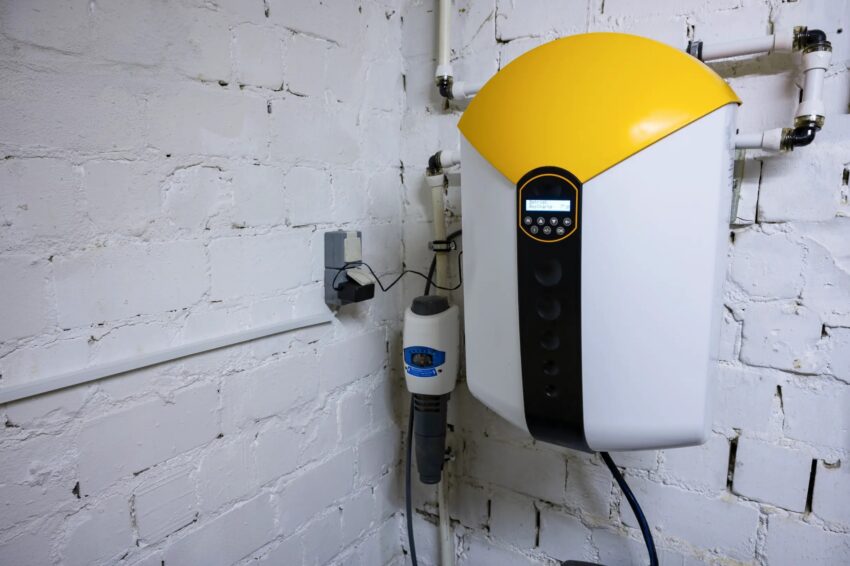
If you deal with hard water in your home, water softeners can help ease some common pain points. The average water softener system in the US costs $1,500, but the price goes up or down dramatically depending on the type of system you choose. High-end systems can cost as much as $11,000, while low-end water softeners cost as little as $50. We’re going over all of the costs associated with water softener systems, including installation, money-saving tips, and common questions.
Initial Considerations: When to Opt for a Water Softener System?
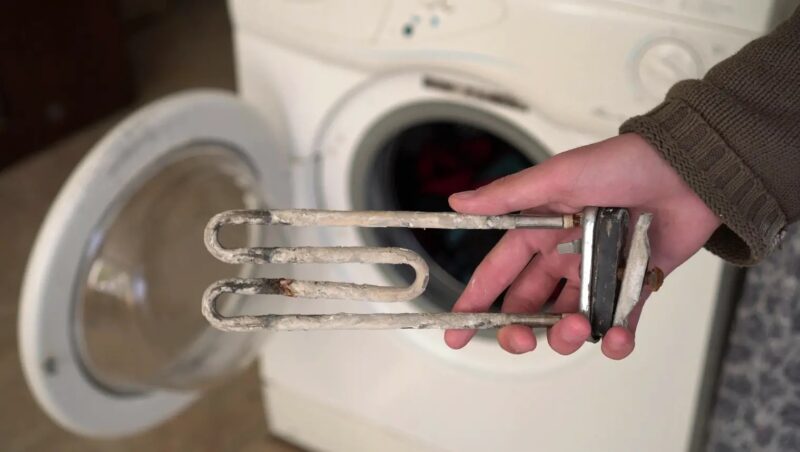
Water softener systems are a simple solution to the problems that come with hard water. There are several ways to identify hard water issues and how they impact everything from your health to your appliances. You might not even be aware of how significant your hard water problems are, but if you look closely, you’ll notice some common symptoms.
Signs and Symptoms
Mineral deposits on faucets and fixtures are among the most common signs of hard water. It’s also easy to tell if you have hard water if your dishes have cloudy spots or if soap scum builds up on your shower walls and door.
Because the minerals in hard water interfere with the effectiveness of soap, it may not lather very well. Mineral deposits also leave behind a scummy residue in your shower that’s difficult to rinse off.
Impact on Household and Appliances
Mineral buildup in your appliances is another sign that you have hard water. You may notice it in your pans after you heat water or in your coffee pot or tea kettle.
Health and Lifestyle Implications
Hard water can impact your health and lifestyle, and it will cause reduced efficiency in your appliances, even causing them to fail prematurely.
Skin and Hair Health
You may notice after showering that your skin is dry and itchy, and your hair is flat and dull. While these health impacts are annoying, hard water has other potential negative impacts on your health that are a greater cause for concern.
Although most experts contend that hard water isn’t associated with any negative health impacts, some studies show that it can cause various health issues, including digestive problems and kidney stones.
Appliance Longevity and Efficiency
Hard water build-up can affect the lifespan of appliances like dishwashers, coffee makers, and water heaters and reduce their efficiency, which results in higher electric bills.
Since water heaters cost a lot to operate and replace, reduced efficiency can be an incentive to install a water softener system to avoid replacement, repair, and operation costs.
Benefits of Installing a Water Softener System
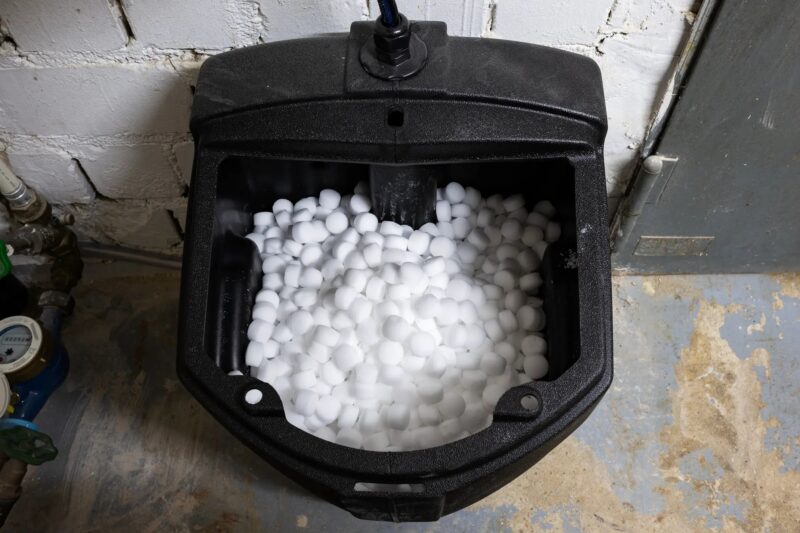

Are water softeners worth installing? There are many benefits to using water softeners to address some of the problems you’ve been having in your home due to hard water. Discover the benefits of installing a water softener system to help you decide.
Preserving Appliance Life
Spending your hard-earned money on appliances like coffee pots, water heaters, and dishwashers that fail before their time is frustrating. It’s money that could be better spent to improve your home in other ways.
The average life expectancy of a water heater is 8 to 12 years, but hard water can cause a water heater to fail about two years earlier than normal. Mineral deposits can also build up on the inside of pipes and other fixtures, which can cause leaky faucets and clogged pipes.
Improving Water Quality
You’ll notice a difference in the quality of your water when you install a water softener system. Improved water quality will eliminate problems with soap residue and mineral deposits on your dishes. Your water may even taste better.
Health and Wellness Benefits
If you have skin problems, hard water may be the cause. Many health issues caused by hard water aren’t even attributed to this common problem.
Mitigating Skin Issues
Skin issues caused by hard water include dry, flaky skin and other symptoms, such as clogged pores, acne, and itchy scalp. Installing a water softener in your home can quickly clear up skin issues.
Ensuring Safe Drinking Water
Safe, clean drinking water is important for your health, but if you have hard water, it may be unpleasant to drink. Installing a water softener system will ensure that you have plenty of good-tasting water in your home.
Factors Influencing Water Softener System Costs
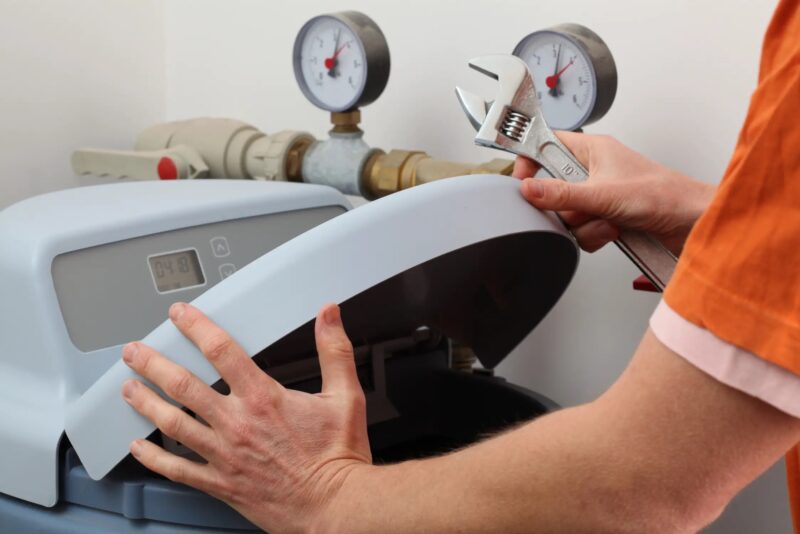

Several factors influence the cost of a water softener system for your home, including the type of system you choose and your household’s size and capacity requirements.
Various System Types and Their Costs
When it comes to water softener systems, there’s a wide range of costs depending on the type you choose. High-end reverse osmosis water softener systems can cost as much as $11,000, while single point-of-use water distillers can cost as little as $50.
The most common types of water softeners are salt-based, but there are also several types of salt-free water softeners.
Here are some common types of water softener systems and their associated costs:
| Water softener system type | Features | Average cost range |
| Ion exchange system (salt-based) | Uses salt to replace hard water ions with sodium ions | $400 to $3,000 |
| Reverse osmosis system | Filters chemicals, toxins, and minerals from your water | $1,000 to $11,000 |
| Single point-of-use reverse osmosis system | Can be installed at the kitchen sink | $100 to $1,300 |
| Magnetic systems | Magnets attached to water pipes neutralize hard water ions | $200 to $600 |
| Salt-free systems | Like ion exchange systems, but they use potassium instead of sodium | $500 to $4,000 |
Size and Capacity Requirements
In addition to choosing a type of water softener system, you must determine the size and capacity required for your household needs.
Household Usage Patterns
The number of people in your household is an important factor in determining the size of the water softener system your home needs. To determine the total household requirement, multiply the number of people in your household by 90 gallons, which is the average number of gallons that people use per day.
Size vs. Efficiency Analysis
You should also get your water tested to determine the capacity required by your household. Water hardness is measured in grains per gallon (GPG) or parts per million (PPM). Most home water softener systems can handle a capacity of about 24,000 GPG.
Additional Water Softener System Costs and Considerations
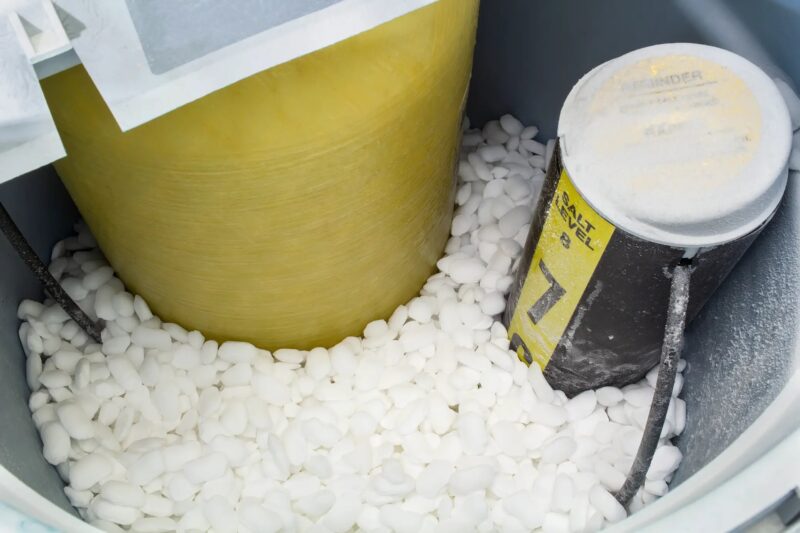

Discover additional costs and factors to consider when pricing a home water softener system.
Supplementary Components and Their Pricing
Water softener systems are composed of three main components, including a control valve, a resin tank, and a brine tank. While your system usually comes with everything you need, you may need additional components for installation.
Reverse Osmosis Systems
Reverse osmosis systems are often paired with salt-based water softeners to filter the sodium out of your water. They also filter out other toxins and chemicals.
Filters and Resins
The resin in a water softener system is used for the ion exchange process. Small resin beads are placed inside the taller resin tank and must be replaced every ten years.
Water filters may also be required for your water softener system.
Connectors and Pipes
Installation of water softener systems requires cutting into the water line and inserting the water softener. This means you’ll need various connectors and pipes for your plumbing system.
Maintenance and Servicing Expenses
Proper maintenance of your water softener system is required to ensure that it works properly. Most water softeners will last about 10 to 15 years when properly maintained.
Regular Service Costs
You can choose to maintain your water softener system yourself or hire a service company to do it for you. Many service companies charge $100 to $300 per year to regularly service your system.
Potential Repair and Replacement Charges
Eventually, your water softener systems may need repairs, which you can do yourself by purchasing a repair kit for about $50. Repairs usually cost $100 to $600 if you hire a professional.
If you must make frequent repairs, consider replacing your water softener system.
Hands-On or Hands-Off: DIY vs. Professional Installation Costs
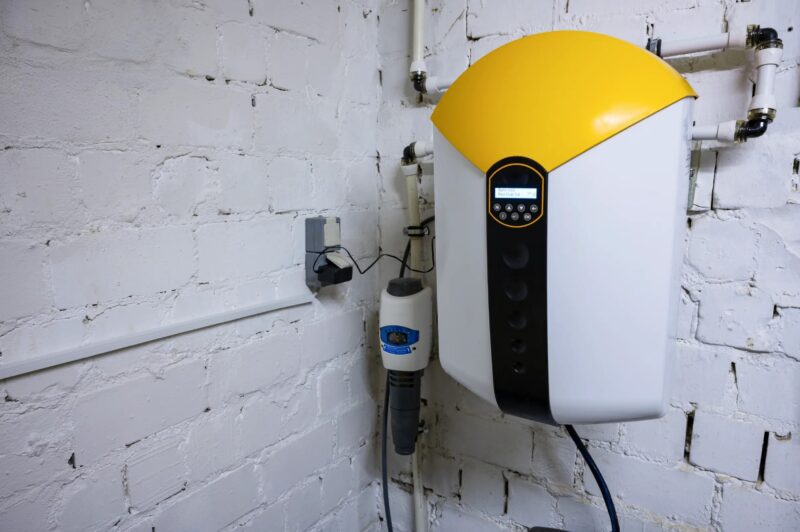

Is replacing a water softener a good DIY project? If you’re DIY savvy and have a few plumbing skills, it’s not hard to install a water softener system. Learn more about the pros and cons of DIY versus professional installation.
Navigating the DIY Route
You’ll need some plumbing skills, but if you’re an experienced DIYer, you can easily install a water system yourself and save hundreds of dollars on water softener installation costs.
Required Tools and Materials
Most water softener systems come with step-by-step instructions, making installation fairly straightforward. Some types can even be installed under your sink and require only minimal amounts of plumbing.
Installations typically require basic plumbing tools and extra pipe, but the tools and materials you need to install a water softener system for your home depend on the type of plumbing you have and the type of system you choose.
Time and Effort Consideration
Most water softener systems can be installed in less than four hours. However, don’t be surprised if it takes most of the day, especially if you’re a beginner.
Investing in Professional Services
Professional plumbers can easily install a water softener system in your home. By choosing professional services, you can ensure expert installation.
Some municipalities require a permit and a licensed plumber to install more complex water softener systems. You may need a professional installation to ensure your warranty isn’t voided.
Budgeting Smartly: Tips to Save on Water Softener System Expenditure


Follow these budget-friendly tips to save money when purchasing a water softener system.
Exploring Cost-Efficient Models
Since there is such a wide range of water softener types, it’s easy to find one that fits your budget by exploring various types, brands, and models.
Budget Brands and Models
Choosing a budget brand is one way to save money on a water softener system. Many budget models are just as good as name brands.
Refurbished and Used Units
Look online for refurbished and used water softeners. Many companies sell reconditioned water softeners and may even offer warranties.
Optimal Maintenance for Cost Avoidance
Water softener systems last about 10 to 15 years. You can avoid problems with them by performing regular maintenance to keep replacement water softener costs low.
Regular Checks and Early Problem Identification
Early problem identification is one of the best preventive maintenance solutions to reduce your costs of ownership. Perform regular checks on salt levels approximately every 4 to 6 weeks. Check your brine tank every few months and clean it at least once a year.
Using Maintenance Kits and Manuals
You can purchase maintenance kits to extend the lifespan of your water softener system. Depending on the type of system you have, you can even find rebuild kits that contain seals, springs, rotors, and o-rings to recondition a water softener.
Quenching Queries: FAQs About Water Softener System Costs
How long does a typical water softener system last?
On average, a water softener system will last about 10 to 15 years. You can tell when it needs to be replaced because you’ll start to notice signs and symptoms of hard water in your home, such as mineral deposits on faucets and fixtures.
Are there rent or lease options available for water softeners?
You can rent a water softener system for about $20 to $50 per month, depending on the type you choose and the going rates in your area.
What are the running and maintenance costs of water softeners?
The operating and maintenance costs associated with running a water softener in your home depend on the type of system you choose. High-end whole-house systems can cost anywhere from $100 to $900 per year to operate.
Can installing a water softener system impact my utility bills?
Many appliances operate at reduced efficiency when you have hard water, particularly your water heater. A water softener system can reduce utility bills by ensuring your water heater performs at peak efficiency.
Is there a notable difference in cost between various brands of water softener systems?
There are many types of water softener systems, and there is a noticeable cost difference between different brands. When comparison shopping, it’s important to keep in mind that many brands offer a range of high and low-end systems at different price points.






